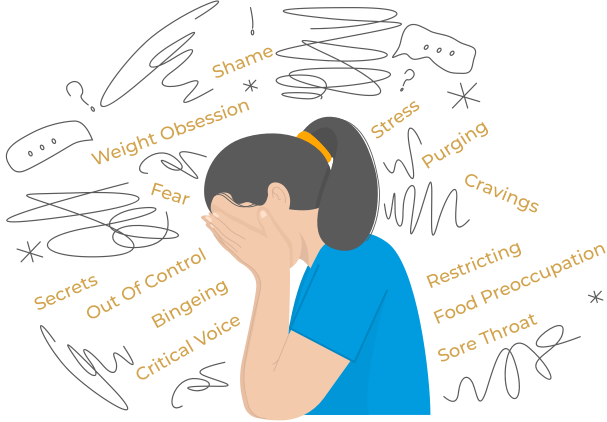Bulimia Nervosa Support
If you feel trapped in a binge–purge cycle – eating in secret, feeling out of control, then overwhelmed by shame – we’ll help you find a safer, steadier way forward, without judgement, and with support around you.
- Integrated care: Psychological, nutritional and medical expertise
- Experienced team: 20 years of evidence-based care
- Safe environment: Compassionate, respectful support
DO ANY OF THESE FEEL FAMILIAR?
You don’t need a diagnosis or label to reach out – if any of this resonates, we can help you take the next safest step.
- Bingeing in secret, then purging (vomiting, laxatives, or “compensating”)
- Feeling out of control during eating, then guilt, shame, or panic afterwards
- Restricting or “resetting” after bingeing, then rebounding into another binge
- Obsessive food rules, calorie counting, or fear of weight change
- Avoiding meals with others, restaurants, or social events involving food
- Feeling high-functioning on the outside, while privately struggling
RESTORING WELLNESS
Bulimia can feel like a relentless loop – food, secrecy, fear, and self-criticism. With the right support, many people begin to experience meaningful changes over time, such as:
- Feeling less controlled by urges and “all-or-nothing” rules
- Building safer coping strategies for stress, anxiety, and difficult emotions
- Developing steadier eating routines that reduce the binge–purge cycle
- Feeling more confident and less trapped by body-image distress
- Reconnecting with relationships, energy, and everyday life
GETTING STARTED
We’ll help you begin with what’s most pressing right now. Some people start with therapy to work through emotional and psychological drivers, while others begin with nutrition support to stabilise eating and reduce deprivation. As you progress, we can coordinate additional support around you, so you’re not trying to piece it together alone.
BOOK A FREE 20-MINUTE DISCOVERY CALL
Choose a time for a confidential, no-pressure call.
We’ll listen, understand what’s been going on, and help you clarify the safest next step – including whether you’d benefit from therapy, nutrition support, or more specialist/integrated care.
Confidential • No pressure • Clear next steps
How It Works
Step 1 — Book a free call
Choose a time that works for you. It’s confidential and there’s no pressure to commit.
Step 2 — Free 20-minute discovery call
Tell us what’s been going on and what support you’re looking for. We’ll gently check what feels most important right now and whether we’re the right fit.
Step 3 — Clear next steps + clinician match
We’ll recommend the safest next step and keep the plan simple (therapy and/or nutrition first), then match you with the right clinician. If we think another service is safer or more appropriate, we’ll tell you.
Watch (0:57): Sarah from our Client Services team explains what happens on the free discovery call.
Prefer to enquire first? Send us a message
FEES & PRICING
Prefer to review pricing first? Explore our clear fees and package options.
HOW WE HELP — AN INTEGRATED TEAM, TAILORED TO YOU
You don’t need to figure out what to book – we’ll recommend the safest next step and keep the plan simple, then coordinate any additional support if needed.

THERAPY
We help you understand what’s driving the binge–purge cycle underneath – triggers, emotional regulation, shame/self-criticism, anxiety, body image, or feeling trapped – and build new strategies that don’t rely on food or purging.

NUTRITION & DIETETICS
We support you to stabilise eating structure (regular meals/snacks), reduce deprivation that fuels binges, and restore your health. Slowly we help you rebuild trust with food in a realistic, non-shaming way.

MEDICAL / PSYCHIATRY
Psychiatric assessment of wider mental health factors may be useful, with medication management if required. Integrating care with our therapy and nutrition teams, and medical monitoring with your NHS GP if required.

JOINED-UP CARE
Your support is coordinated so you’re not piecing it together alone – one clear plan, with the right clinician(s) involved at the right time.
MEET JAMES, OUR FOUNDER & CEO
James shares how we work with bulimia support at WeightMatters – and what a supportive first step can look like.
TRUSTED, CONFIDENTIAL SUPPORT
Many people tell us the hardest step is reaching out – these are a few words from clients about what it was like to be supported.
“Making those initial calls is terrifying, so it’s really lovely to have a kind person on the other end of the line… makes all the difference.”
– Milly
“James has been instrumental in helping me transform my relationship with food. I’ve gone from using it as a way to control fear to understanding how my eating habits are connected to emotions and past experiences.”
– Thomas
“After years of failed diets, I realised I needed a different approach. WeightMatters helped me understand the root causes of my eating behaviours… The team is professional, compassionate, and truly supportive.”
– Amy
“I have been consumed for years by… being trapped in an endless cycle of either eating nothing or eating everything. For the first time, I felt properly listened to and properly understood.”
– Karen
Selected feedback from WeightMatters clients. Individual experiences vary.
PATIENCE – DOES THIS FEEL FAMILIAR? Doing “fine” on the outside – while bingeing, purging, and fear of being found out take over behind the scenes.
Patience’s story is one many people recognise – a private cycle that starts with stress or self-criticism and ends with shame and “reset” rules.
- Trigger: stress, overwhelm, loneliness, or body-image anxiety
- Binge: eating quickly, feeling out of control, often in secret
- Purge/compensate: trying to undo it, regain control, or reduce anxiety
- Aftermath: guilt, shame, low mood, physical discomfort
- Reset rules: restricting, skipping meals, “starting again tomorrow”
- Readiness: wanting support that’s compassionate, structured, and safe
TRAPPED IN A BINGE–PURGE–RESTRICT LOOP

Bulimia often follows a pattern that can feel impossible to break – especially when it’s driven by fear, shame, and the urge to regain control.
A cycle can look like: trigger → binge → shame/panic → purge/compensate → restrict/reset → repeat.
Restriction and rigid rules can increase deprivation (physically and mentally), which often makes urges stronger – and the loop continues. Support helps you reduce shame, stabilise eating, and build safer coping strategies so the pattern loosens over time.
WARNING SIGNS & COMMON EFFECTS
Bulimia can look “fine” from the outside – but inside it can take a serious toll on your mind, body, and relationships.
Behaviours You Might Notice
- Bingeing followed by purging (vomiting, laxatives, “compensating”)
- Eating in secret, hiding food, or disappearing after meals
- Restricting or rigid “reset” rules after bingeing
- Compulsive exercise or needing to “burn off” food
- Avoiding meals with others or social plans involving food
- Feeling trapped in an all-or-nothing pattern
Thoughts & Feelings That Often Come With It
- Shame, guilt, fear of being “found out”
- Anxiety around eating, social events, or routine changes
- Intense body dissatisfaction and fear of weight change
- Perfectionism, harsh self-criticism, and low self-esteem
- Low mood, irritability, emotional numbness
- Feeling isolated or like you’re living a double life
Many people appear high-functioning on the outside – and still need support.
Package Options & Add-Ons
Depending on what you need, you may also choose one of these structured options – and we can help you decide what fits best during your free discovery call.
FAQs
If you’re unsure where to start, but some of the descriptions on this page resonate with your experience, these answers may help – and you can always book a free discovery call to talk it through.
Bulimia nervosa typically involves binge eating (feeling out of control while eating) followed by purging or compensatory behaviours (such as vomiting, laxatives, or other attempts to “undo” eating). Many people experience intense shame, secrecy, and fear of weight change.
Yes. Many people with bulimia are not underweight. Appearance isn’t a reliable indicator of how serious the situation is. If you’re stuck repeating binge–purge cycles and distress, it’s worth getting support.
This depends on your situation and frequency. Some people need medical monitoring due to risks like dehydration or electrolyte imbalance. We can help you understand the safest next step, including whether medical input is appropriate.
Bulimia is often maintained by a loop of trigger → binge → shame → purge → restrict/reset → repeat. Restriction and self-criticism commonly make urges stronger. Support focuses on stabilising eating, reducing shame, and building safer coping strategies.
Often both can help, but not always at the same time. In your discovery call, we’ll recommend a safe starting point: therapy first, nutrition first, or a simple combined plan.
It’s a confidential, no-pressure conversation. We’ll ask what’s been happening, what you’ve tried, what feels most difficult right now, and what you want to change. We’ll then suggest clear next steps – including whether you’d benefit from therapy, nutrition support, or additional medical input.
That’s very common. You don’t have to share everything in one go. We’ll meet you where you are and help you take one manageable step at a time.
Yes. Recovery can take time, and setbacks can happen, but many people make meaningful progress with structured support. We’ll help you create a plan that fits your situation.
Both can work well. Some people prefer online for privacy and convenience; others feel safer meeting in person. We’ll help you choose what’s most supportive for your situation.
Yes. Your enquiry and sessions are confidential. We’ll explain how confidentiality works and when we might need to share information for safety reasons (for example, if there’s immediate risk). In day-to-day terms: you can speak openly and safely, and we’ll be clear about boundaries.
CLINICAL STANDARDS & HOW WE WORK
We follow clear clinical standards so you know what to expect – from confidentiality and consent, to safe next steps and appropriate signposting.
How We Work
- Clinician-led, evidence-informed support tailored to your situation
- Confidential, respectful care with clear boundaries and consent-led communication
- Integrated support where helpful (therapy, nutrition, and medical oversight when needed)
- Collaborative care if appropriate – we can liaise with your GP/consultant, with your permission
- Appropriate onward signposting if you need a different type of support or a higher level of care
- Privacy and data protection – see our Privacy Policy
Safety Note – If you’re feeling at immediate risk of harm or having suicidal thoughts, please seek urgent support via 999/A&E, 111, or your GP.
We follow internal clinical governance and safeguarding standards; details are available on request.
Content owner: James Lamper, Clinical Director
Clinically reviewed by: Dr Natascha Van Zyl, Director of Talking Therapies
Last reviewed: February 2026
RELATED SERVICES
Explore these support options we may recommend as part of your care.
Therapy • Dietitian Support • Nutritional Therapy • Psychiatry • Healing Disordered Eating
NEURODIVERSITY POSITIVE PRACTICE
We aim to create a space where every brain is understood and respected – including sensory sensitivities, anxiety, and rigid patterns that can overlap with eating difficulties.
IF IT FEELS EASIER, EMAIL US
Have a question before booking? Leave your details and our Client Services team will reply with a personalised response. Confidential and no pressure.
